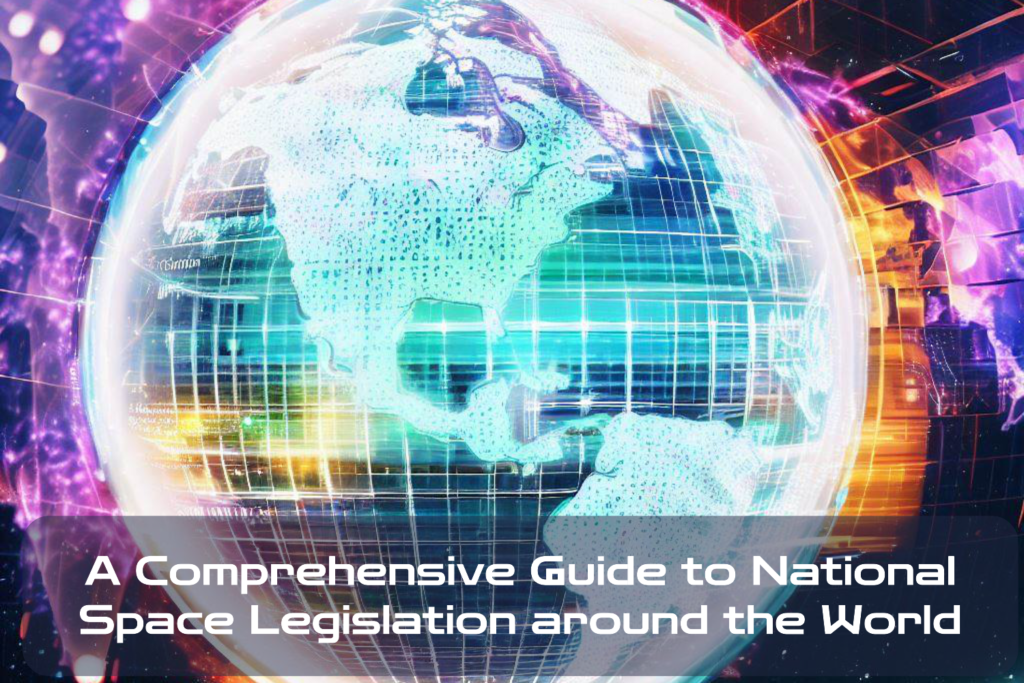Space Law: Why it Matters
Space exploration has always been a fascination for mankind. From the days of Galileo to Neil Armstrong landing on the moon, space exploration has captured our imagination. However, outer space is not just a place for astronauts and scientists; it is also an area of economic and strategic importance.
As more countries become involved in space activities, the need for international regulation becomes more important than ever. This is where national space legislation comes into play.
National space legislation refers to a set of laws and regulations that govern a country’s activities in outer space. These laws are put in place to ensure that countries engage in safe, responsible, and sustainable practices in outer space.
National space laws cover issues such as launch licenses, satellite operations, liability for damages caused by satellites or debris, and many other aspects of our activities in outer space. The importance of national space legislation lies in its ability to promote peace and cooperation between countries engaged in outer-space activities.
Space law ensures that all parties involved follow best practices when conducting their operations and lays out clear guidelines on how disputes should be resolved. Additionally, by providing legal frameworks for commercial activity such as satellite launches or mining operations on celestial bodies like asteroids or moons, national space legislation promotes innovation and economic growth.
The Development of National Space Legislation

As different nations started developing their own capabilities for conducting operations in outer-space, they realized there was a need to create appropriate legal frameworks to govern their actions beyond Earth’s atmosphere. The first international agreements were made during the Cold War era between the US and Soviet Union, but it wasn’t until 1967, with the signing of The Outer Space Treaty by United Nations General Assembly (UNGA), that a comprehensive legal framework was created that defined rules governing international cooperation on peaceful uses of outer-space.
In the years following The Outer Space Treaty’s establishment, many advancements were made, including environmental safety and liability regulation, commercial space activities, and intellectual property rights.
Today, numerous countries have space agencies and are actively engaged in outer-space activities. As such, it has become essential for countries to develop their own national space legislation to regulate their respective outer-space policies.
Countries often differ in the specifics of their laws, but there is a shared framework rooted in The Outer Space Treaty that most adhere to. This article will explore the development of national space legislation in different countries and how each country’s unique legal framework defines their role in exploring the final frontier.
The United States
From the Cold War to Commercial Spaceflight: The History of US Space Legislation
The importance of space exploration has been ingrained in the American psyche since the Soviet Union launched Sputnik in 1957. Since then, a complex web of laws and regulations has been developed to govern American activities in space.
Some of the most important laws include the National Aeronautics and Space Act of 1958, which established NASA, and the Commercial Space Launch Act of 1984, which paved the way for private companies to enter the space industry. One major turning point came with President George W. Bush’s Vision for Space Exploration in 2004, which aimed to return humans to the moon by 2020.
This led to a new era of policy development that emphasized commercial partnerships with private companies like SpaceX and Blue Origin. In recent years, Congress has passed numerous bills aimed at streamlining regulations and promoting innovation in space exploration.
The Current Legal Landscape: Understanding US Space Law Today
Today, there are several key agencies responsible for enforcing space-related laws in the United States.
NASA is responsible for ensuring that all commercial launches comply with its safety standards before they are allowed to take place. The Federal Aviation Administration’s Office of Commercial Space Transportation regulates launch vehicles and reentry vehicles, as well as licensing commercial launches.
Another important law is the Outer Space Treaty (OST), which was ratified by the United States in 1967. The OST forms part of customary international law governing activities beyond Earth’s atmosphere, such as prohibiting weapons or national appropriation.
Key Players: Who Shapes US Space Policy?
Beyond government agencies, individuals play a crucial role in shaping US space policy through advocacy groups such as The Planetary Society and organizations like Blue Origin or SpaceX, which influence their respective strategies in government policy discussions. Furthermore, key congressional leaders hold sway over the funding and direction of NASA’s programs, such as the Senate Committee on Commerce, Science, and Transportation or House Committee on Science, Space and Technology.
Overall, the United States’ involvement in space can be described as heavily regulated but also increasingly collaborative with private enterprise. By balancing safety concerns with innovation, policymakers hope to continue to explore new frontiers and maintain America’s leading position in space exploration.
The Evolution of Russian Space Policy
Russia has a profound history in space exploration.
It was the first country to launch an artificial satellite, Sputnik 1, in 1957 and sent the first man, Yuri Gagarin, into space four years later. The Soviet Union’s success in space was due to a variety of factors, including political will and top-down management, but also due to strong regulations that facilitated innovation while maintaining safety standards.
Soviet-era Space Laws
During its early days of space exploration, the Soviet Union established strict rules regarding space activities. These were aimed at ensuring national security and international control over activities in outer space. According to these rules, only state organizations could conduct activities related to space exploration and research.
In 1972, the Soviet Union signed the Outer Space Treaty, which provided a framework for international cooperation for peaceful uses of outer space. The treaty also emphasized that outer space is not subject to national appropriation or ownership by any country.
Post-Soviet Developments
After the dissolution of the Soviet Union in 1991, Russia inherited its legacy as a leading player in the field of space exploration. However, with limited financial resources and a changing political environment, Russia’s capacity to manage its own programs declined rapidly during the 1990s.
In recent years, though, there has been a resurgence, with Russia placing great emphasis on developing strategic partnerships for collaboration in various areas, including launch services and satellite navigation systems. To support these efforts, new legislation has been put forward creating a legal framework designed to regulate both public and private sector activities within Russian territory related to manned flights into outer space or other celestial bodies; unmanned flights, as well as the creation or operation of spacecraft within this territory or beyond it.
Current State of Russian Space Legislation
Today, Russian space legislation is among the most comprehensive systems in the world. Its most significant law regarding space activities is the Federal Space Program (FSP), which outlines the country’s goals and objectives for national space exploration, research, and commercialization.
The FSP also includes provisions for licensing and regulating private sector participation in space activities. It provides a framework for cooperation with international partners as well as overseeing the safety of space missions carried out within Russia’s territory.
Overall, Russia has taken important steps to develop its national legal framework for outer space activities. Despite ongoing challenges, including budget constraints and aging infrastructure, the country remains committed to maintaining its status as one of the key players in global space exploration efforts.
China
China’s Emergence as a Major Player in Space Exploration
When it comes to space exploration, China is a relatively new player on the scene. However, over the past few decades, China has made significant strides in developing its space program. In 2003, China became the third country to launch a human into space, and since then, it has continued to make impressive advances in space technology.
In 2019, China became the first country to land a spacecraft on the far side of the Moon. One of China’s major goals when it comes to space exploration is establishing a long-term presence on the Moon.
In addition to landing a spacecraft on the far side of the Moon, China launched another mission in 2020 that collected rocks and debris from the lunar surface. These samples have been brought back to Earth for scientific study and analysis.
Development of Chinese Space Law
In order to regulate its growing space program, China has developed its own national space law. The law was first enacted in 1996 and has undergone several revisions since then. The most recent revision was made in 2015 and includes provisions for both civil and military activities in outer space.
One notable aspect of Chinese space law is its focus on international cooperation and peaceful uses of outer space. The law explicitly states that “China advocates international cooperation in peaceful uses of outer space” and “opposes weaponization or any arms race” in outer space.
Key Features and Differences from Other Countries’ Laws
Compared to other countries’ laws regarding outer space activities, there are some key features that set Chinese space law apart. One feature is that Chinese law requires all launches (including those by foreigners) conducted within Chinese territory or by Chinese entities to obtain approval from relevant government authorities beforehand. Additionally, foreign entities are not allowed to own or participate in the operation of Chinese satellites.
Another notable difference is that China requires foreign entities to sign agreements with the Chinese government before conducting any research or scientific activities in outer space. These agreements must outline details such as the purpose of the activity, the scope of work, and any potential hazards or risks involved.
Overall, China’s space program and accompanying national space law demonstrate an increasingly prominent role for the country in exploring outer space. As China continues to make strides in this area, it will be interesting to see how its laws and regulations continue to evolve.
The EU’s Regulatory Role in Outer Space Activities
The European Union (EU) plays a significant role in regulating space activities within its member states. The EU’s regulatory framework for outer space activities is designed to promote safety, security, and environmental protection while facilitating the development of a competitive European space industry. One of the key functions of the EU’s regulatory framework is to coordinate and harmonize national laws and regulations related to space activities across member states.
This includes licensing requirements for launching and operating spacecraft, as well as rules governing the use of radio frequencies and satellite orbits. By providing a common legal framework for these activities, the EU aims to reduce regulatory barriers to entry for new market players while ensuring that all operators adhere to high safety standards.
Overview of EU’s Legal Framework
The core legal instrument underpinning the EU’s regulatory framework for space activities is the “Space Regulation.” This regulation provides a comprehensive set of rules governing all aspects of space activities within the jurisdiction of the European Union. It covers areas such as licensing and registration requirements, insurance and liability regimes, safety standards, environmental protection measures, and export controls.
In addition to the Space Regulation, there are several other key legal instruments that form part of Europe’s overall approach to regulating outer space activities. These include various international treaties such as the United Nations Outer Space Treaty (OST) and subsequent agreements designed to supplement it, as well as bilateral agreements with third countries on cooperation in space-related fields.
Overall, Europe has developed a strong legal framework that balances commercial interests with safety concerns and environmental protection measures. By promoting harmonization across member states while adhering strictly to international law norms governing outer space activities, Europe is positioning itself as a leader in this rapidly evolving field.
Other Countries
Japan: Striving for Space Autonomy
Japan’s space program has been heavily influenced by international cooperation, with a focus on technological advancements and scientific research. Japan’s space legislation has been in place since the early 1970s, but it was not until 2008 that a new basic law on space activities was enacted, outlining the country’s commitment to space exploration and utilization. Japan’s space law places a strong emphasis on international cooperation and information sharing, while also striving for greater national autonomy in its space endeavors.
India: From Developing to Developed Nation
India’s space program has grown rapidly over the past few decades, with ambitious goals of establishing a presence on the Moon and Mars. India’s national space legislation is relatively new, with the Space Activities Bill introduced in 2017.
The bill seeks to regulate all aspects of India’s space activities, from launch vehicles to remote sensing satellites. One unique aspect of India’s law is its focus on promoting private sector participation in the country’s growing space industry.
Canada: Balancing International Obligations and National Interests
Canada has a long history of involvement in international partnerships for space exploration, including contributions to NASA missions and participation in the International Space Station program. Canada’s national legal framework for outer space activities dates back to 1967 with the Outer Space Treaty Act. In recent years, Canada has been revising its laws to better reflect current practices and align with international obligations while maintaining its own interests as a nation.
Overall, each country approaches their national legislation differently based on their own priorities and values while also adhering to international agreements. It will be interesting to see how these laws evolve over time as technology advances and more countries become involved in exploring outer space.
Challenges and Future Developments

Challenges Faced by Countries in Developing National Space Legislation
Developing national space legislation can be a complicated process with many challenges to overcome.
One of the biggest challenges is creating laws that are comprehensive and adaptable enough to address the rapidly evolving field of space technology.
This is especially important as more and more countries become involved in space exploration, leading to an increase in international collaboration and possibly conflicting interests.
Another challenge is balancing the need for regulation with the desire for innovation.
Without appropriate regulations, there could be serious safety concerns or potentially harmful actions taken by companies or individuals in space. However, overly restrictive regulations could stifle innovation and exploration, limiting what can be accomplished.
There is also the issue of cooperation between countries with varying levels of experience and different cultural values regarding space activities. Finding common ground while still protecting individual interests will likely remain a challenge for years to come.
Potential Future Developments and Trends in the Field
The future of national space legislation is likely to be influenced by a variety of factors, including
- technological advancements,
- new commercial opportunities,
- geopolitical shifts,
- and environmental concerns.
One potential trend is increased collaboration between governments and private companies in developing regulations that promote safety while still encouraging innovation.
Another trend could be an increased focus on sustainability in outer space activities. With concerns about orbital debris increasing, there may be a push for regulations that promote responsible behavior when it comes to managing waste or reducing pollution.
As more countries become involved in space exploration and exploitation efforts, there may be an increased emphasis on establishing international norms or standards for behavior in outer space. This could lead to greater cooperation between countries as they work towards common goals.
Final Thoughts

Throughout this article, we have explored the development of national space legislation in different countries. From the United States to China and Russia, each country has a unique history and set of laws governing their space activities. The United States has been a leader in space exploration since near the beginning of the Space Age, and its regulatory framework reflects this.
Key players such as NASA and the Federal Aviation Administration have played important roles in shaping US space law. In contrast, Russia’s legal system for outer space activities has been heavily influenced by its Soviet-era legacy.
Meanwhile, China’s emergence as a major player in space exploration has given rise to its own set of regulations that differ from those of western nations. The European Union also plays an important role in regulating European space activities through its legal framework for outer space activities.
And while other countries such as Japan, India, and Canada have their own national laws related to outer space activities, they often reflect similar approaches to those taken by Western nations. Developing national space legislation is a complex process that requires careful consideration of numerous factors, ranging from technical requirements and safety concerns to political considerations and international obligations.
It is clear that there are still challenges facing countries seeking to develop their own regulatory frameworks for outer space activities. Despite these challenges, however, there remains great optimism about how continued innovation surrounding national legislation will continue to shape new developments within our universe—both – and figuratively speaking within our global community – legally binding us together through new rules on how we explore beyond our planet Earth!

C M, a seasoned editor, journalist, and consultant, is deeply fascinated by the convergence of technology, space, and the future of humanity.
With a particular interest in transhumanity, futurology, and the philosophical and ethical dimensions of these domains, C M serves as the lead contributor to SpaceSpotlight and TranscendSphere.
When not penning insightful articles on these rapidly evolving fields, C M indulges in their love for podcasts and books, proudly embracing their status as a ‘Happy Nerd Extraordinaire!’



